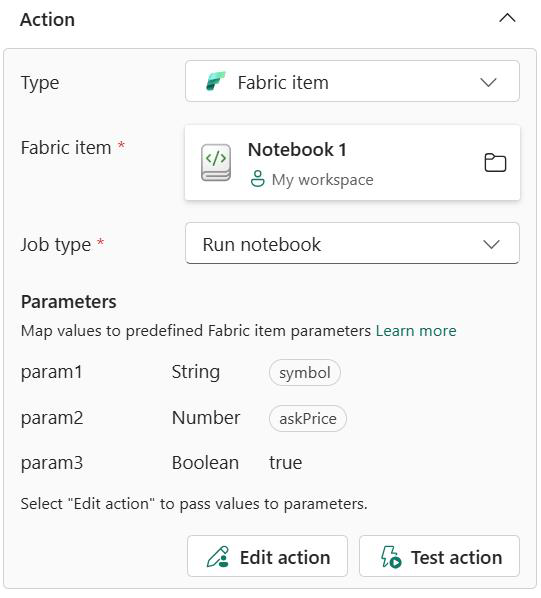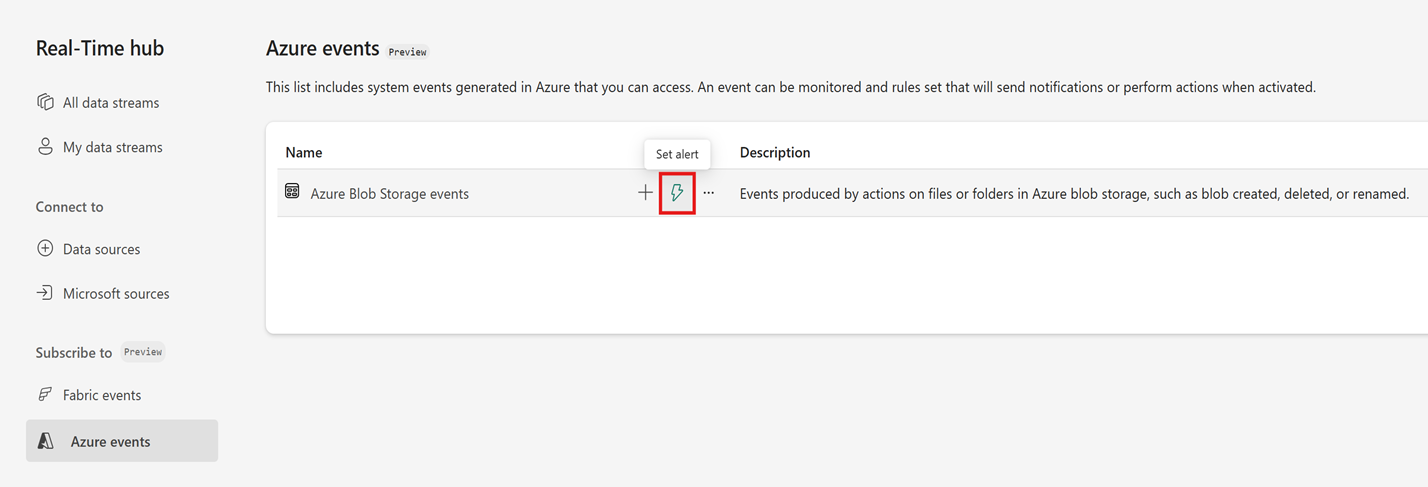Note
Access to this page requires authorization. You can try signing in or changing directories.
Access to this page requires authorization. You can try changing directories.
Fabric Data Pipelines and Notebooks can be used to load or transform data in Microsoft Fabric. Fabric Activator rules can take an action that starts jobs on Fabric items, which can be used in the following scenarios:
Run Data Pipelines when new files are loaded to Azure storage accounts, to load files into OneLake. You can learn more about Azure Storage events.
Run Fabric Notebooks when issues with data quality are found using Power BI reports. You can learn more about getting data from Power BI.
How to trigger a job on Fabric items
Start by selecting an existing Activator rule or creating a rule.
In the rule definition pane on the right side of the screen, find Action section to define the action when chosen condition is met. Select Fabric item as the action type and select a specific item from the OneLake Data Hub pop-up window.
Test, start, or stop an Activator rule
Once you enter all of the required information, select Save to save the Activator rule. To test the rule, select Test action. To start the rule, select Start from the top menu bar and to stop the rule, select Stop. Stop only appears while a rule is active.
Pass parameter values to Fabric items (Preview)
You can now pass values to the parameters defined in the activated Fabric item. To pass parameter values in Activator portal, select Edit action, enter the parameter name and type exactly as how they are defined in the Fabric item. The parameter values can be entered manually or by selecting dynamic properties from the data source.

Pass parameter values via rules created outside of Activator portal
If you are setting up an Activator rule from one of the embedded experiences such as Power BI, Real-Time Hub, or Data Pipeline, you can create the rule first. After the rule is created, you can click Open Activator to edit the parameter values:
- Set up the rule from data pipeline
- Set up the rule from Real-Time hub: To set a rule from an Azure event (as an example) in Real-Time hub, select Azure events on the left navigation menu, and then select Set alert.
Types of parameters
Activator enables passing parameters in string, boolean, and number (float). Follow the guidelines to pass number and boolean:
Number
| Input Value | Result | Valid value? | Notes |
|---|---|---|---|
123.45 |
123.45 | Yes | Dot as decimal separator |
1,234.56 |
1234.56 | Yes | Comma as thousands separator |
0.99 |
0.99 | Yes | |
1e3 |
1000 | Yes | Scientific notation |
123,45 |
0 | No | Invalid in en-US (comma not decimal) |
| null or whitespace | 0 | No | |
| any other string | 0 | No |
Boolean
| Input Value | Result | Valid value? | Notes |
|---|---|---|---|
true |
true | Yes | Case-insensitive |
1 |
true | Yes | |
yes |
true | Yes | |
y |
true | Yes | |
false |
false | Yes | Case-insensitive |
0 |
false | Yes | |
no |
false | Yes | |
n |
false | Yes | |
| null or whitespace | false | No | |
| any other string | false | No |
Note
Make sure the parameter name and type are defined exactly the same as defined the activated Fabric item. If you have any feedback or ideas regarding this feature, share it on Activator community.
Related content
You can also learn more about Microsoft Fabric:
